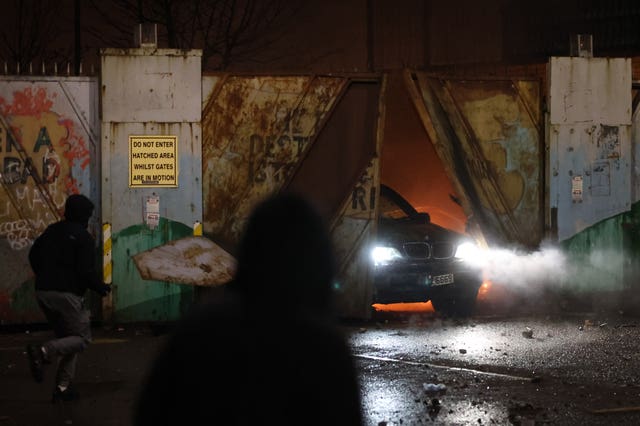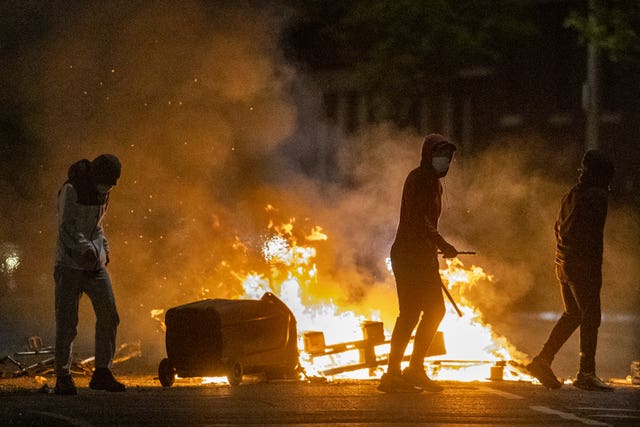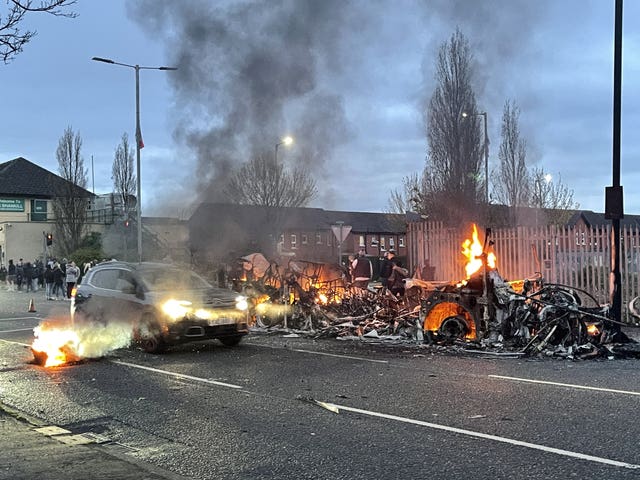
DOUGLAS Ross has condemned the "shocking" further violence on the streets of Belfast as he was quizzed about post-Brexit trading arrangements that have created economic barriers between Northern Ireland and the rest of the UK.
The street disorder that has flared in various parts of Northern Ireland for more than a week can be attributed to a multitude of factors.
At its heart is loyalist anger at an Irish Sea border.
Speaking on BBC Radio Scotland's Good Morning Scotland, the Scottish Conservative leader was asked whether the violence was "what he had in mind" when he voted to put a border down the middle of the Irish Sea.
Mr Ross said: "Of course no one wants to see the scenes that we've seen in Northern Ireland.
"We have to ensure that everyone works together to stop these scenes happening again and getback under control, because no one wants to see the violence, the destruction of property and the risk everyone is put under in these circumstances."
When grilled about his claim that checks down the middle of the Irish Sea would protect communities of Northern Ireland and the peace process from damaging faultlines, he said "that is exactly what we intend to do."
He added: "We have to work together, all parties will have to do that."
It comes as the Northern Ireland Executive is to meet this morning to be briefed on the ongoing unrest seen over the last week.
Leaders will meet for the briefing at 10am, an hour before the Stormont Assembly is to be recalled to discuss the recent scenes of violence in mainly loyalist areas.
News of the meeting was confirmed late on Wednesday night as trouble continued to rage on the streets of Belfast, with Executive members scheduled to debate a motion condemning the recent attacks on police.
Mr Ross added: "We've got to ensure that we look at what is going on in Northern Ireland at the moment and deal with it urgently, because we can't see a repeat of the scenes that have been dominating the news for the last 12 hours."
He also said he thought Prime Minister Boris Johnson could be trusted to resolve the issues.
Yesterday, Deputy First Minister Michelle O’Neill tweeted: “The Executive will meet tomorrow morning to be briefed on the violence and street disorder which is causing huge distress in local communities at this time.
“Those involved in violence, criminal damage, manipulation of our young people and attacks on the police must stop.”
Violent scenes including attacks on police, petrol bombings and rioting have taken place repeatedly on the streets of Belfast and Derry throughout the past week.
 A car bursts through the Peace Gates in Lanark Way on Wednesday night (Liam McBurney/PA)
A car bursts through the Peace Gates in Lanark Way on Wednesday night (Liam McBurney/PA)
Wednesday night saw a bus hijacked and set on fire, a press photographer assaulted and clashes between loyalists and nationalists at peace line street that links the Shankill Road with the Springfield Road in west Belfast.
The scenes of violence flooded social media and prompted UK Prime Minister Boris Johnson to appeal for calm.
He tweeted: “I am deeply concerned by the scenes of violence in Northern Ireland, especially attacks on PSNI who are protecting the public and businesses, attacks on a bus driver and the assault of a journalist.
“The way to resolve differences is through dialogue, not violence or criminality.”
The unrest has been attributed to tension in loyalist communities over the Northern Ireland Protocol on Brexit and the PSNI’s handling of alleged coronavirus regulation breaches by Sinn Fein at the funeral of republican Bobby Storey.
 People stand next to a fire in a street in Belfast on Wednesday night (Liam McBurney/PA)
People stand next to a fire in a street in Belfast on Wednesday night (Liam McBurney/PA)
First Minister Arlene Foster condemned the attacks on Twitter, saying: “There is no justification for violence. It is wrong and should stop.”
“This is not protest. This is vandalism and attempted murder. These actions do not represent unionism or loyalism.
“They are an embarrassment to Northern Ireland and only serve to take the focus off the real law breakers in Sinn Fein. My thoughts are with the bus driver.”
This is not protest. This is vandalism and attempted murder. These actions do not represent unionism or loyalism. They are an embarrassment to Northern Ireland and only serve to take the focus off the real law breakers in Sinn Fein. My thoughts are with the bus driver. https://t.co/2JRcOb6s8C
— Arlene Foster #WeWillMeetAgain (@DUPleader) April 7, 2021
Irish premier Micheal Martin also condemned Wednesday night’s events, tweeting: “I utterly condemn the violent attacks on police, a journalist, and bus driver over recent days in The North.
“Now is the time for the two Governments and leaders on all sides to work together to defuse tensions and restore calm.”
Plans to recall the Assembly were already underway after Alliance Party leader Naomi Long secured the required support of 30 members to force a return.
Ms Long – who serves as Justice Minister – said it is her party’s intention to get all parties at Stormont to “unite around a call for calm and the cessation of violence”.
Some 41 police officers had been injured and 10 people arrested over the disturbances, prior to the events on Wednesday night.
Ms Long told RTE that she also wants to hear all elected representatives express confidence in policing structures and in the rule of law.
“Over the last number of weeks we have heard increasingly inflammatory public comments around policing in Northern Ireland, political comments that have been deeply and profoundly unsettling and we have then seen this spill over into violence on the streets,” she said.
 A car drives past the wreckage of a Translink Metrobus on fire on the Shankill Road (Liam McBurney/PA)
A car drives past the wreckage of a Translink Metrobus on fire on the Shankill Road (Liam McBurney/PA)
“These situations and intentions of course then will be exploited by those in paramilitary organisations, so it is incumbent on all of us who are in leadership at a time like this to come together and to speak with one voice to say that this violence must stop and irrespective of our various political views, that we do not support it, that we do not want to see it continue but more than that, that we are absolutely committed to the rule of law and to fair and equitable policing across our society.”
The violence has been blamed on anger in response to a decision by the Public Prosecution Service not to pursue prosecutions against members of Sinn Fein who attended the funeral of Mr Storey last year despite restrictions over gatherings, as well as Brexit and localised issues in the south-east Antrim area.




Why are you making commenting on The Herald only available to subscribers?
It should have been a safe space for informed debate, somewhere for readers to discuss issues around the biggest stories of the day, but all too often the below the line comments on most websites have become bogged down by off-topic discussions and abuse.
heraldscotland.com is tackling this problem by allowing only subscribers to comment.
We are doing this to improve the experience for our loyal readers and we believe it will reduce the ability of trolls and troublemakers, who occasionally find their way onto our site, to abuse our journalists and readers. We also hope it will help the comments section fulfil its promise as a part of Scotland's conversation with itself.
We are lucky at The Herald. We are read by an informed, educated readership who can add their knowledge and insights to our stories.
That is invaluable.
We are making the subscriber-only change to support our valued readers, who tell us they don't want the site cluttered up with irrelevant comments, untruths and abuse.
In the past, the journalist’s job was to collect and distribute information to the audience. Technology means that readers can shape a discussion. We look forward to hearing from you on heraldscotland.com
Comments & Moderation
Readers’ comments: You are personally liable for the content of any comments you upload to this website, so please act responsibly. We do not pre-moderate or monitor readers’ comments appearing on our websites, but we do post-moderate in response to complaints we receive or otherwise when a potential problem comes to our attention. You can make a complaint by using the ‘report this post’ link . We may then apply our discretion under the user terms to amend or delete comments.
Post moderation is undertaken full-time 9am-6pm on weekdays, and on a part-time basis outwith those hours.
Read the rules hereLast Updated:
Report this comment Cancel